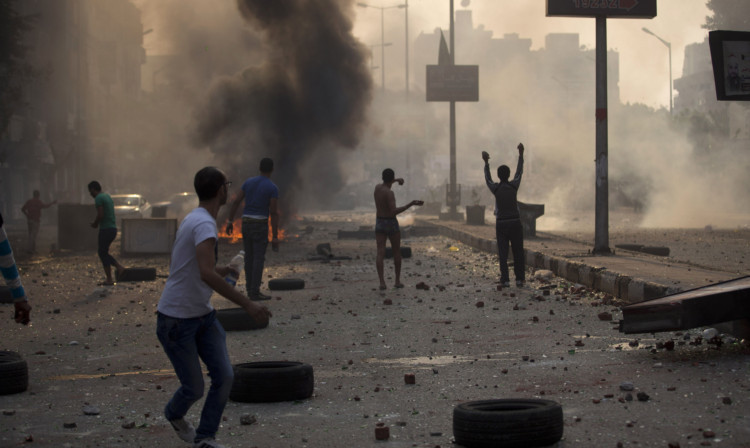Security forces and Islamist protesters have clashed around the country, leaving 51 killed, as a national holiday celebrating the military turned to mayhem.
Crowds from Egypt’s two rival camps – supporters of ousted Islamist president Mohammed Morsi, and backers of the military that deposed him – poured into the streets and turned on each other.
Several neighbourhoods of the capital, Cairo, resembled combat zones after street battles that raged for hours. Morsi supporters fired birdshot and threw firebombs at police who responded with gunshots and tear gas. Streets were left strewn with debris, and the air was thick with tear gas and smoke from burning fires, as the crack of gunfire rang out.
An Associated Press photographer saw nine bodies lying on the floor of a clinic in the Cairo district of Dokki, scene of some of the heaviest clashes. Most of the bodies had gunshot wounds to the head or chest.
Sunday’s death toll of 51 was the highest on a single day since August 14 when security forces raided two sit-in protest camps by Morsi supporters, killing hundreds.
Even as fighting continued in the streets, the military went ahead with lavish celebrations for the holiday marking the 40th anniversary of the start of the 1973 war with Israel.
In the evening, a concert was aired live on state TV from a military-run Cairo stadium where pop stars from Egypt, Lebanon and the Gulf sang anthems to the army and dancers twirled on stage before a cheering crowd. Military chief General Abdel-Fattah el-Sissi, other top brass and interim president Adly Mansour attended the show.
“There are those who think the military can be broken,” Gen el-Sissi said in an address at the concert. “You see the pyramids? The military is like the pyramids, because the Egyptian people are on its side.”
The clashes were the latest chapter in the turmoil roiling the country since the ouster in February 2011 of autocrat Hosni Mubarak. The new violence is certain to set back efforts by the interim, military-backed government to revive the economy, especially the vital tourism sector, and bring order to the streets of Cairo, where crime and lawlessness have been rife.
Morsi was Egypt’s first civilian and first freely elected president, succeeding four since the early 1950s who hailed from a military background. But after a year in office, Morsi was faced by massive protests demanding his ouster, accusing his Muslim Brotherhood of taking over power – and on July 3, Gen el-Sissi removed him.
The military is now back as the real source of power in Egypt, and state and independent media have been depicting it as the country’s saviour – with growing calls for Gen el-Sissi to run in the presidential election due early next year.
